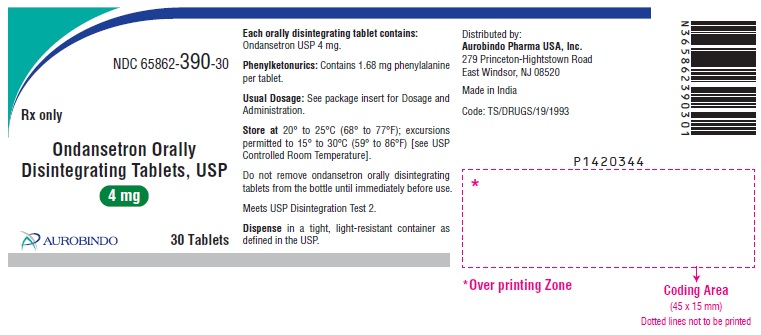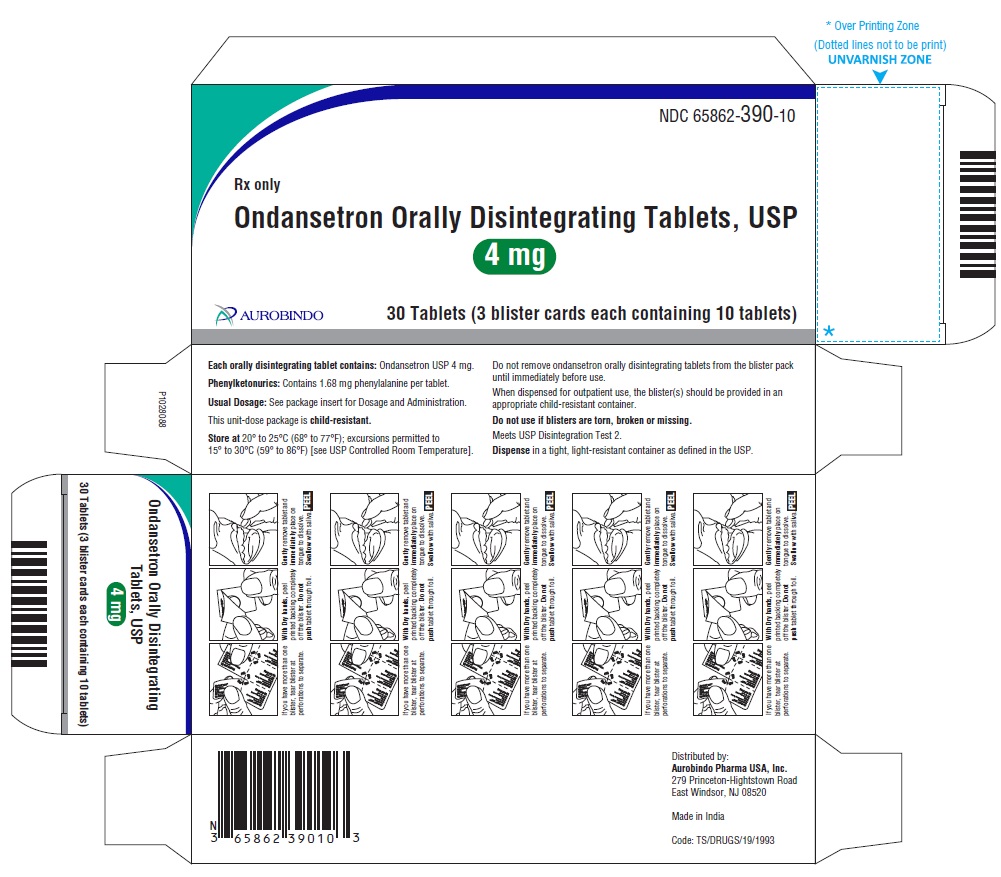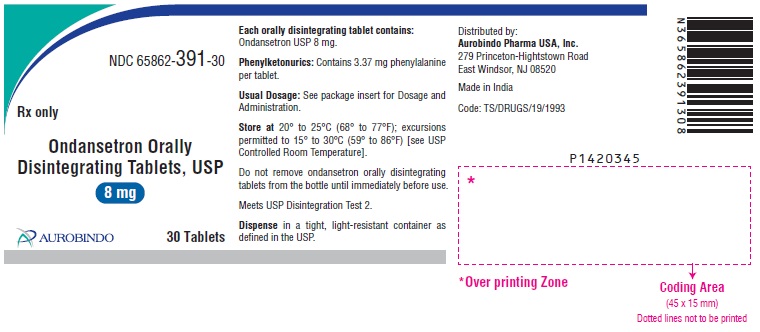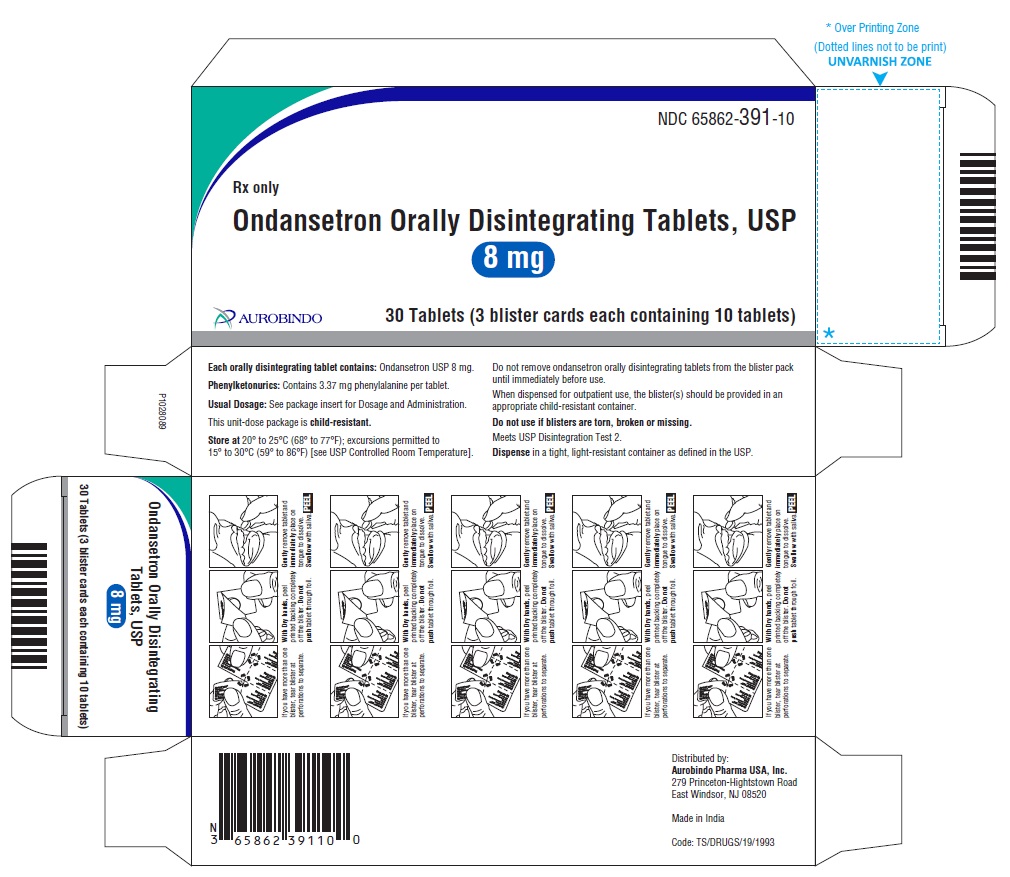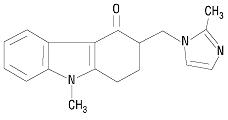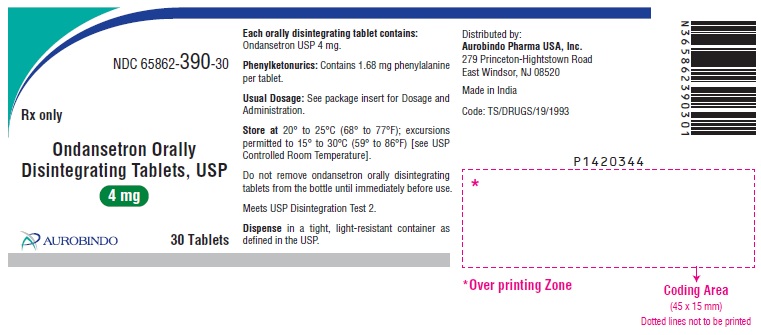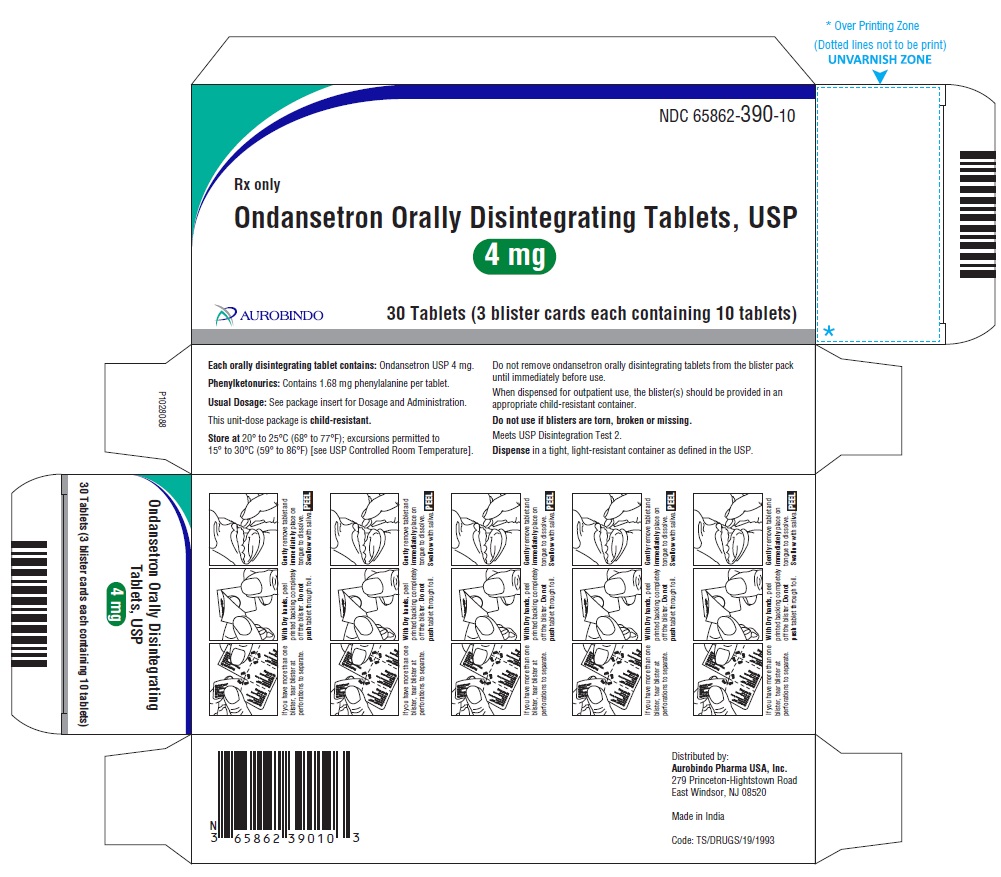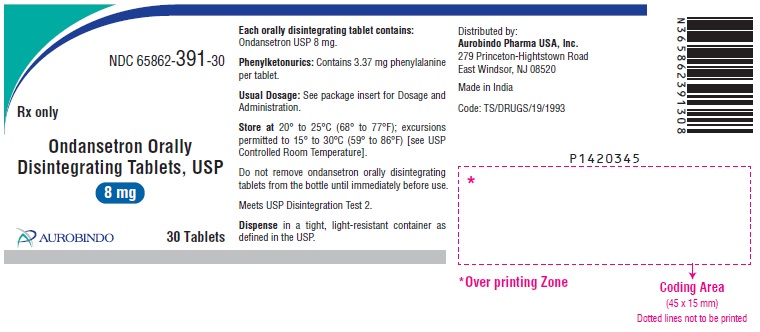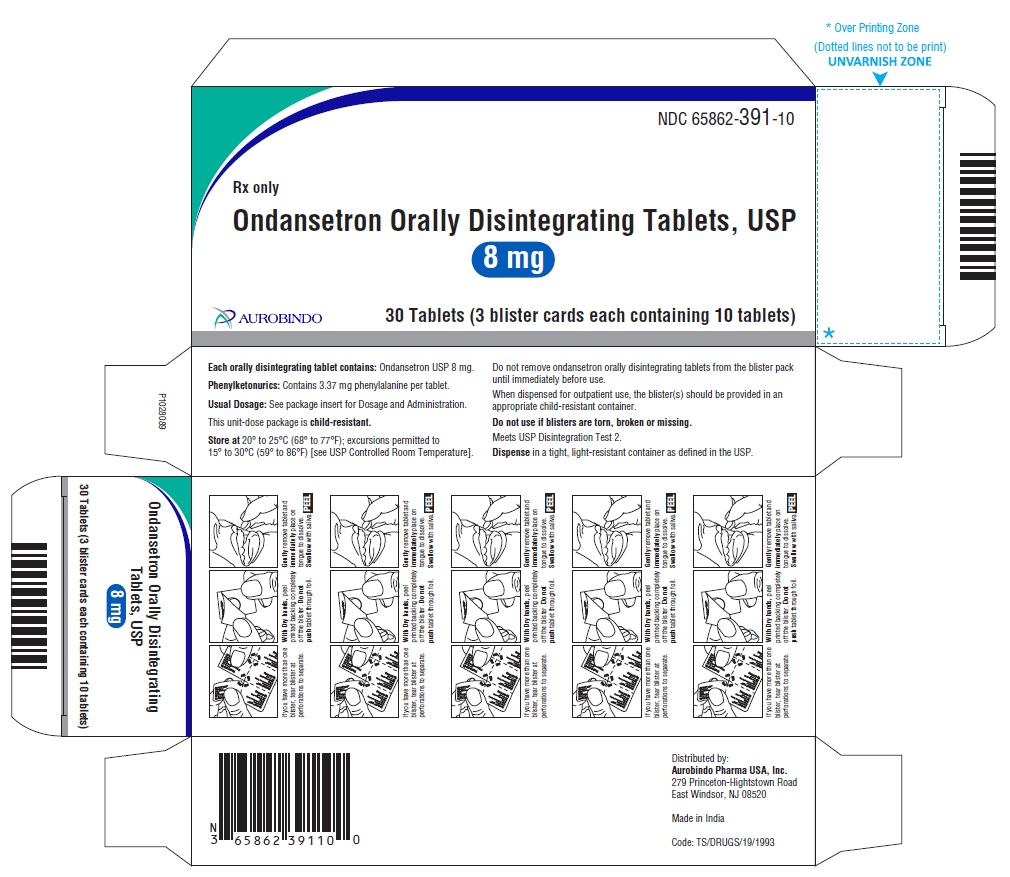Label: ONDANSETRON tablet, orally disintegrating
- NDC Code(s): 65862-390-02, 65862-390-05, 65862-390-10, 65862-390-19, view more
- Packager: Aurobindo Pharma Limited
- Category: HUMAN PRESCRIPTION DRUG LABEL
- DEA Schedule: None
- Marketing Status: Abbreviated New Drug Application
Drug Label Information
Updated April 8, 2024
If you are a consumer or patient please visit this version.
- Download DRUG LABEL INFO: PDF XML
- Official Label (Printer Friendly)
-
HIGHLIGHTS OF PRESCRIBING INFORMATIONThese highlights do not include all the information needed to use ONDANSETRON ORALLY DISINTEGRATING TABLETS, safely and effectively. See full prescribing information for ONDANSETRON ORALLY ...
-
Table of ContentsTable of Contents
-
1 INDICATIONS AND USAGEOndansetron orally disintegrating tablets are indicated for the prevention of nausea and vomiting associated with: highly emetogenic cancer chemotherapy, including cisplatin greater than or equal ...
-
2 DOSAGE AND ADMINISTRATION2.1 Dosage - The recommended dosage regimens for adult and pediatric patients are described in Table 1 and Table 2, respectively. Corresponding doses of ondansetron tablets, ondansetron orally ...
-
3 DOSAGE FORMS AND STRENGTHSOndansetron Orally Disintegrating Tablets USP, 4 mg are white to off-white, round tablets debossed with ‘5’ on one side and ‘E’ on the other side with an embossed circular edge. Ondansetron ...
-
4 CONTRAINDICATIONSOndansetron orally disintegrating tablets are contraindicated in patients: known to have hypersensitivity (e.g., anaphylaxis) to ondansetron or any of the components of the formulation [see ...
-
5 WARNINGS AND PRECAUTIONS5.1 Hypersensitivity Reactions - Hypersensitivity reactions, including anaphylaxis and bronchospasm, have been reported in patients who have exhibited hypersensitivity to other selective 5-HT3 ...
-
6 ADVERSE REACTIONSThe following clinically significant adverse reactions are described elsewhere in the labeling: Hypersensitivity Reactions [see Warnings and Precautions (5.1)] QT Prolongation [see Warnings ...
-
7 DRUG INTERACTIONS7.1 Serotonergic Drugs - Serotonin syndrome (including altered mental status, autonomic instability, and neuromuscular symptoms) has been described following the concomitant use of 5-HT3 receptor ...
-
8 USE IN SPECIFIC POPULATIONS8.1 Pregnancy - Risk Summary - Published epidemiological studies on the association between ondansetron use and major birth defects have reported inconsistent findings and have important ...
-
9 DRUG ABUSE AND DEPENDENCEAnimal studies have shown that ondansetron is not discriminated as a benzodiazepine nor does it substitute for benzodiazepines in direct addiction studies.
-
10 OVERDOSAGEThere is no specific antidote for ondansetron overdose. Patients should be managed with appropriate supportive therapy. In addition to the adverse reactions listed above, the following adverse ...
-
11 DESCRIPTIONThe active ingredient in ondansetron orally disintegrating tablets, USP is ondansetron base, the racemic form of ondansetron and a selective blocking agent of the serotonin 5-HT3 receptor type ...
-
12 CLINICAL PHARMACOLOGY12.1 Mechanism of Action - Ondansetron is a selective 5-HT3 receptor antagonist. While its mechanism of action has not been fully characterized, ondansetron is not a dopamine-receptor antagonist ...
-
13 NONCLINICAL TOXICOLOGY13.1 Carcinogenesis, Mutagenesis, Impairment of Fertility - Carcinogenic effects were not seen in 2-year studies in rats and mice with oral ondansetron doses up to 10 mg/kg per day and 30 mg/kg ...
-
14 CLINICAL STUDIES14.1 Prevention of Chemotherapy-Induced Nausea and Vomiting - Highly Emetogenic Chemotherapy - In 2 randomized, double-blind, monotherapy trials, a single 24 mg oral dose of ondansetron was ...
-
16 HOW SUPPLIED/STORAGE AND HANDLINGOndansetron Orally Disintegrating Tablets USP, 4 mg are white to off-white, round tablets debossed with ‘5’ on one side and ‘E’ on the other side with an embossed circular edge ...
-
17 PATIENT COUNSELING INFORMATIONHypersensitivity Reactions - Inform patients that ondansetron may cause hypersensitivity reactions, some as severe as anaphylaxis and bronchospasm. Instruct patients to immediately report any ...
-
PACKAGE LABEL-PRINCIPAL DISPLAY PANEL - 4 mg (30 Tablets Bottle)NDC 65862-390-30 - Rx only - Ondansetron Orally - Disintegrating Tablets, USP - 4 mg - AUROBINDO 30 Tablets
-
PACKAGE LABEL-PRINCIPAL DISPLAY PANEL - 4 mg Blister Carton (3 x 10 Unit-dose)NDC 65862-390-10 - Rx only - Ondansetron Orally - Disintegrating Tablets, USP - 4 mg - AUROBINDO 30 Tablets (3 blister cards each containing 10 tablets)
-
PACKAGE LABEL-PRINCIPAL DISPLAY PANEL - 8 mg (30 Tablets Bottle)NDC 65862-391-30 - Rx only Ondansetron Orally - Disintegrating Tablets, USP - 8 mg - AUROBINDO 30 Tablets
-
PACKAGE LABEL-PRINCIPAL DISPLAY PANEL - 8 mg Blister Carton (3 x 10 Unit-dose)NDC 65862-391-10 - Rx only Ondansetron Orally Disintegrating Tablets, USP - 8 mg - AUROBINDO 30 Tablets (3 blister cards each containing 10 tablets)
-
INGREDIENTS AND APPEARANCEProduct Information

